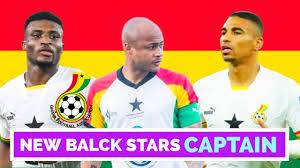Captaincy Debate: Jordan Ayew vs. Alexander Djiku for Ghana's Clash Against Sudan
As Ghana prepares for its upcoming match against Sudan, a pivotal question looms over the Black Stars: who should wear the captain's armband—Jordan Ayew or Alexander Djiku? Both players possess unique attributes that could significantly impact the team's performance. This article delves into the strengths of each player, their leadership styles, and the potential implications for Ghana’s campaign.
Jordan Ayew: The Experienced Leader
Jordan Ayew, with his extensive experience on both the international and club stages, brings a wealth of leadership to the Black Stars. Having represented Ghana in numerous competitions, including the Africa Cup of Nations and World Cup qualifiers, Ayew's familiarity with high-stakes situations is invaluable. His tenure in various top European leagues, notably in the English Premier League, has honed his skills and resilience.
Ayew’s leadership is characterized by his ability to inspire teammates and maintain morale. His presence on the pitch can galvanize the team, especially in challenging moments. Known for his attacking prowess, Ayew also leads by example, frequently contributing goals and assists. This dual role of a captain—performing well individually while motivating others—makes him a strong candidate for captaincy.
However, his leadership style can sometimes come under scrutiny. Critics argue that Ayew’s intensity may lead to frustration, particularly if the team is not performing well. Nonetheless, his emotional investment in the game often translates to a fierce desire to win, which can be contagious among teammates.
Alexander Djiku: The Rising Defensive Leader
On the other hand, Alexander Djiku represents a new generation of leadership within the Ghana national team. As a central defender, Djiku offers a different perspective on captaincy. His role in organizing the defense is crucial, and having a captain who understands the intricacies of defensive play can provide stability to the team.
Djiku has made a name for himself in Ligue 1 with solid performances, showcasing his tactical awareness and ability to read the game. His calm demeanor and composure under pressure make him a reliable figure on the pitch. While he may not have the same level of international experience as Ayew, his performances suggest that he possesses the potential to grow into a leadership role.
One of Djiku's key strengths is his communication skills. As a defender, he must constantly coordinate with teammates, making him an ideal candidate to provide strategic direction during matches. His leadership may also foster a sense of unity among defenders, ensuring that the backline operates cohesively.
The Captaincy Decision
The choice between Ayew and Djiku hinges on the team’s current needs and strategy. If Ghana seeks an experienced leader capable of driving the team forward and inspiring aggressive play, Ayew would be the preferable option. His attacking mindset could motivate the squad to adopt an offensive approach against Sudan.
Conversely, if the focus is on building a strong defensive framework, Djiku could be the ideal choice. His understanding of defensive dynamics and ability to remain calm under pressure could be crucial, especially if the match turns into a tactical battle.
Future Implications
Regardless of the immediate decision, the captaincy debate has broader implications for the future of the Ghana national team. Choosing Djiku could signify a shift toward a new leadership era, paving the way for younger players to take on more responsibility. This could enhance team cohesion and promote a long-term vision for success.
In contrast, retaining Ayew as captain would reinforce the importance of experience in critical matches. It may also provide a stabilizing influence for younger players still adapting to international football.
Conclusion
Ultimately, the decision on who should captain Ghana against Sudan reflects the broader goals of the national team. Both Jordan Ayew and Alexander Djiku offer unique qualities that can influence the game in different ways. As Ghana looks to secure a crucial victory, the right captain could make all the difference in achieving their ambitions on the pitch.



No comments yet
Be the first to share your thoughts!